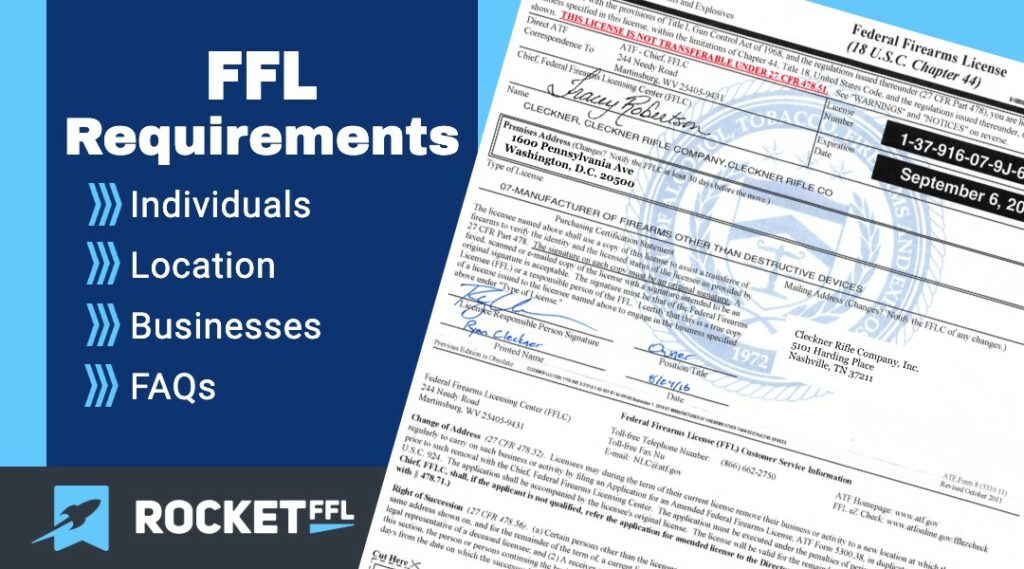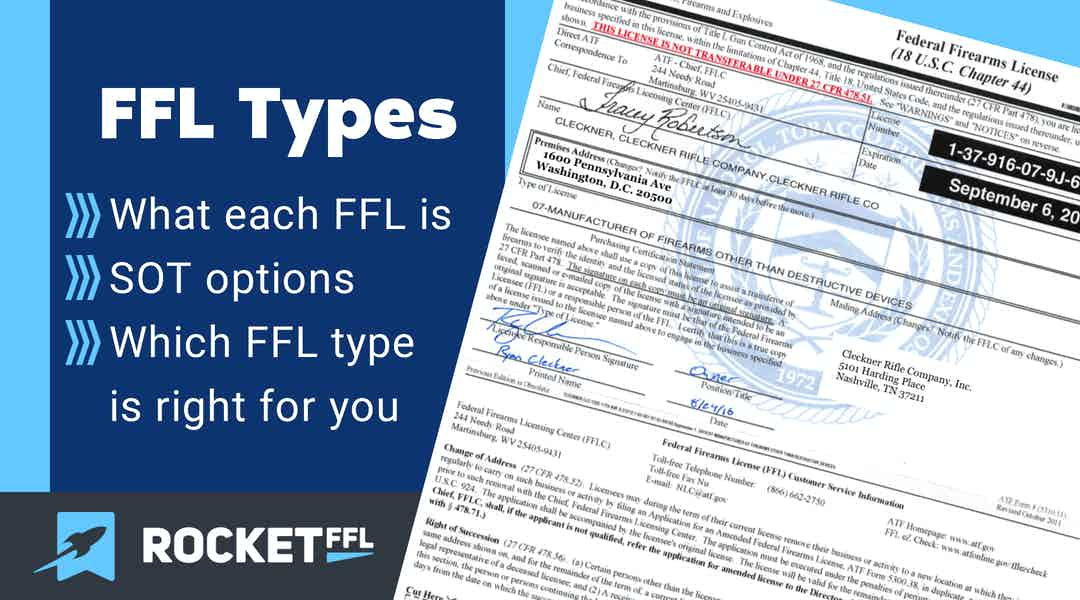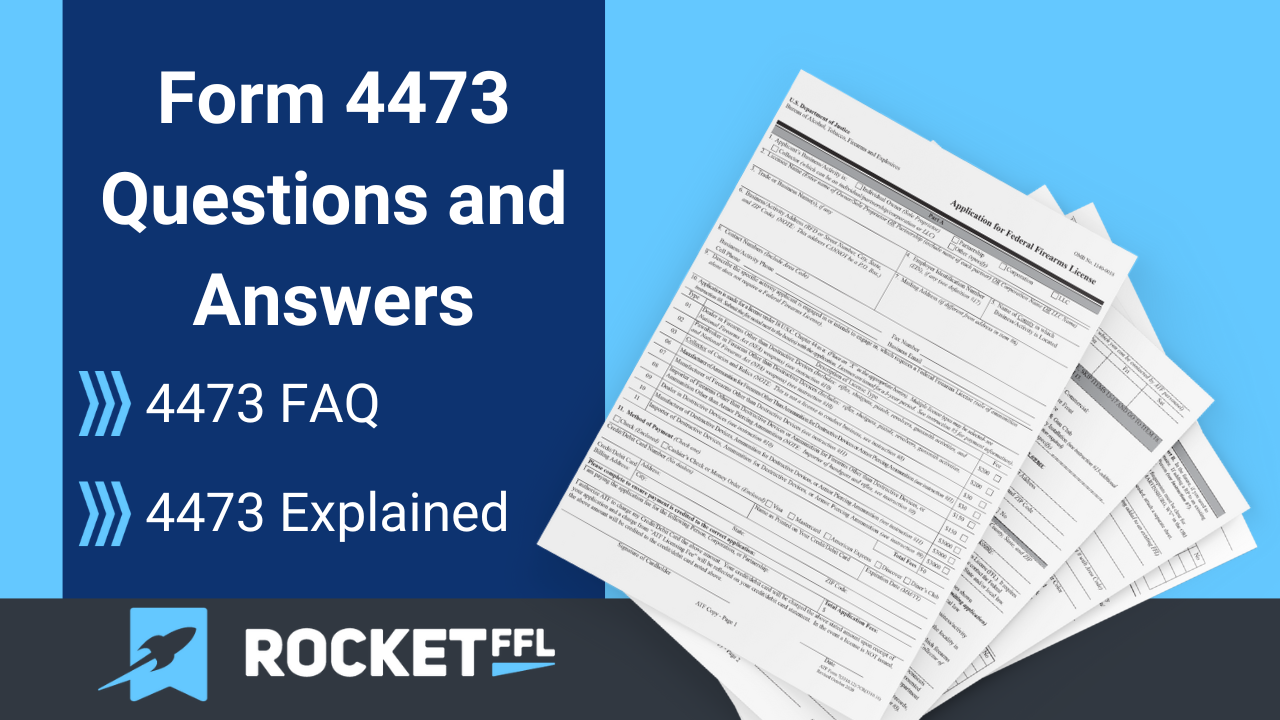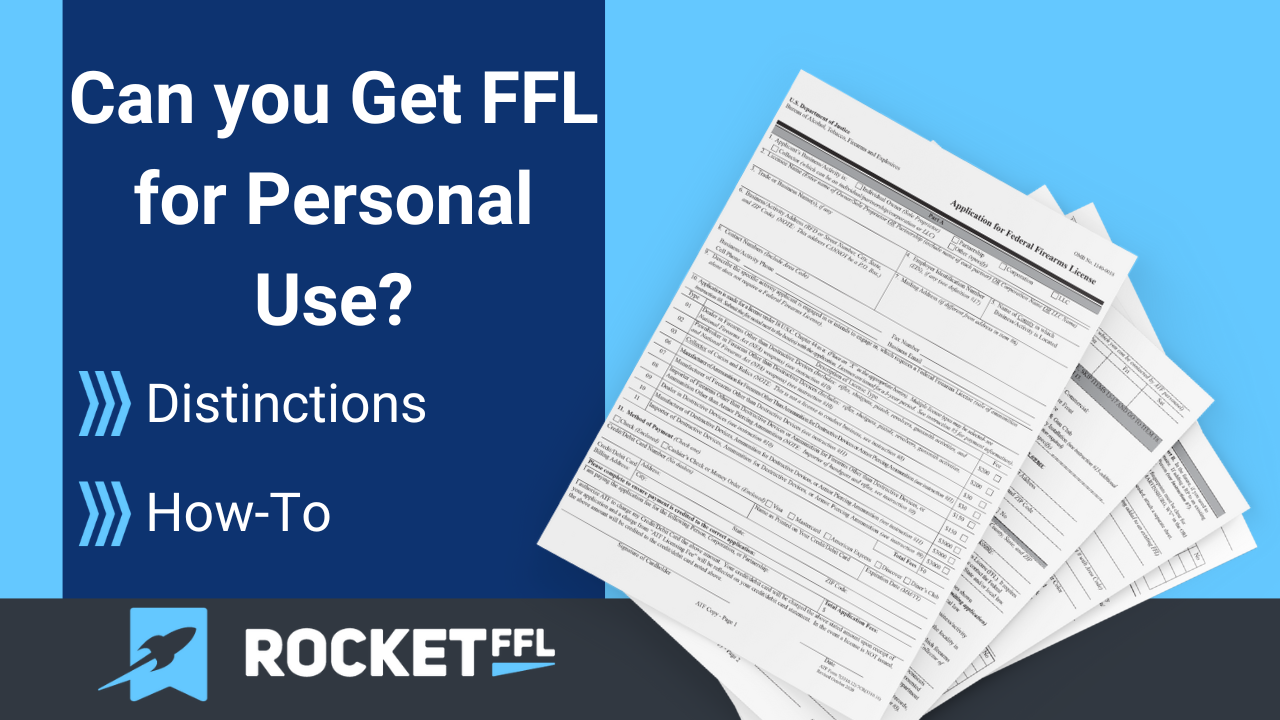There a different types of FFL to choose from. Make sure you understand which FFL type is best for you.

FFL Requirements – How To Qualify for a Firearm License [2025]
Ok, you can see where the firearms industry is heading and you’ve realized that this year is the best time to get an FFL to become a firearms dealer or even a licensed manufacturer but you’re not sure about the requirements for becoming an FFL holder.
We get it – the whole process can seem complicated, and possibly overwhelming.
First, you’ll need to determine if you qualify for an FFL.
Second, you’ll need to decide which ffl type is right for your needs, how much the application fee will cost for your license type, and then you’ll need to make sure you set everything up the right way during the application process so that you don’t run into trouble with the ATF later.
Third, you’ll need to learn the nuances of ATF Compliance so you can operate with your FFL license effectively.
You’ve also likely heard some terms that you’re not quite sure whether they apply to you like: Class 3 License and “Responsible Person.”
Don’t Panic!
This is exactly why we’re here: The entire purpose of the RocketFFL online courses is to help you learn about what all of these things mean, make the right decisions along the way, and give you the tools you need to thrive as an FFL dealer or manufacturer.
If you’re ready to get started, we think the best place is to start with our Get Your FFL course. If you get going now, you can have your own FFL in around 2 months.
However, if you’d like to learn a bit more about whether you can get an FFL, keep reading.
In this article, we’re going to cover:
What is an FFL?
Having an FFL license means that someone may engage in the business of buying, selling, and/or making firearms.
Depending on the type of federal firearms license , guns can be purchased and sold as part of a business, guns can be manufactured for sale, and/or firearms can be imported.
If you also become an SOT, you can be a firearm dealer or manufacturer that works with NFA firearms like silencers (suppressors), short-barreled rifles (SBR), machine guns, and more.
You don’t need to be a full-fledged FFL dealer or manufacturer, you can have an FFL just to make money on an ffl transfer by charging an FFL transfer fee or you can be a gunsmith.
FFL Meaning
The term FFL means “Federal Firearm License.”
The term FFL is also sometimes interchangeably used to refer to the holder of an FFL.
Therefore “FFL” refers to the actual license and also the person/entity that holds the license (the licensee). Therefore the term can be used to describe a gun dealer as an FFL and also the license that the gun dealer has.
FFL License Requirements
Contrary to popular belief, the requirements to get an FFL aren’t that hard.
In fact, if you can possess a firearm, you are at least 21 years old, you can fill out an ATF form, and you have a location for your license, then you can get an FFL.
It’s just about that easy.
FFL License Requirements:
- Be a U.S. Citizen
- Be at least 21 years old
- Be legally allowed to possess a firearm and ammunition
- Have a location for conducting FFL activities ( home-based FFLs are the most popular FFLs in the country)
- Ensure that your business activity at that location meets zoning requirements
- NOT have violated the Gun Control Act (GCA) or its regulations
- NOT lied on your FFL application
[ 18 U.S.C. 923(d)(1) ; 27 CFR 478.47(b) ]
Of course, this is a simplified version of what is needed.
The full requirements for getting an FFL can be broken-down into two major categories:
- FFL license requirements for individuals (you), and
- Business/entity requirements for an FFL
FFL Requirements for Individuals
In order to get an FFL from the ATF, you need to be able to possess firearms and ammunition.
There are certain people who do not meet the requirements to get an FFL (nor may they possess firearms or ammunition). These people are considered “prohibited persons” by the ATF and they include anyone who:
- is a felon
- has been convicted of any crime punishable by more than a year in prison (whether or not they were ever sentenced to or served a day in prison)
- is under indictment for any crime punishable by more than a year in prison
- is a fugitive
- is an unlawful user of any controlled substance
- has been adjudicated as a mental defective
- has been committed to a mental institution
- is an illegal alien
- has a dishonorable discharge from the military
- has renounced their U.S. citizenship
- is the subject of a restraining order restraining the person from harassing, stalking, or threatening an intimate partner or the child of an intimate partner, or
- who has been convicted of a misdemeanor crime of domestic violence
There are a few nuances that you might need to be aware of if you think that any of these apply to you – especially the “convicted of any crime punishable by more than a year,” “unlawful user of a controlled substance,” and “restraining order” provisions.
If you’d like to learn more about these prohibited person categories, see Prohibited Persons / Firearm Possession .
A little-known fact about FFL requirements is that the ATF must issue you an FFL if you meet the requirements. Unlike some other licenses which are “may issue,” an FFL is a “shall issue” license. This means that the ATF doesn’t get to decide if someone who meets the requirements will get an FFL. Instead, once the requirements are met, the ATF shall (must) issue a Federal Firearms License.
FFL Requirements for Businesses/Entities
In addition to the FFL requirements above, your business/entity must also meet some basic requirements before it can be a firearms business.
The most straightforward requirements are that your business/entity must be properly formed – i.e registered with your state, an employer identification number (EIN) if not a sole-proprietor, etc.
The biggest requirement, and the most difficult for some, is the business/entity’s location. Simply, you must be permitted to conduct the business activity at the location you’ve chosen. These FFL location requirements vary depending on your state of residence.
Yes, you can get a home based FFL under federal law but your state may have special rules prohibiting it. For example, if you’re living in an apartment building in New York City, you probably aren’t going to get an FFL.
As long as your local zoning approves of you having a firearms license at the address you choose, then the ATF will give you a home-based FFL. There are a few tricks to getting your FFL at your home – I share all of these and more in the Get Your FFL Guide.
Thankfully, the ITAR requirements have changed (in a great way) and aren’t a concern anymore for most people looking for FFL licensing.
State-level Requirements for FFLs
There are various state requirements for getting your FFL and also how you must run your FFL’s day-to-day operations.
Both of these requirements are covered in our Get Your FFL course.
These state-level requirements involve knowing your local law and sometimes filing paperwork with your state police. For example, selling a handgun in Connecticut requires paperwork for the State Police.
As local law varies greatly and can change quickly, we cover the major considerations in our course, but we can’t cover everything.
If you are concerned about any of these, our member’s area is a great resource and your ATF inspector from the BATF can be a great resource during your initial compliance inspection.
Don’t panic about a compliance inspection – we will walk you through all of this in our course.
And also, please don’t think that you’re on your own when it comes to local law. We do cover these as much as we can – just know that things can change quickly.
Business Intent FFL Requirement
In order to get an FFL from the ATF, you MUST have a business intent.
This may not be as big of a deal as you think but it’s not minor either.
You do not have to have a business plan to open up a retail gun shop. But, you must have at least some business intent.
For example, “occasional sales” can work whereas “personal collection only” for firearm enthusiasts is not. In some cases, listing and selling some firearms online is enough – there is no minimum. The intent is what matters.
No intent to bring in some money with your FFL = no FFL for you. However, this does not mean that you have to be profitable.
Conducting an occasional firearm transfer (and charging an FFL transfer fee) can be enough.
FFL Requirements FAQ
The term “FFL” means “Federal Firearms License.”
If someone has an FFL, it means that they may engage in firearm business activity – this includes, buying, selling, and making guns for a profit.
If you can legally possess a firearm, you are at least 21 years old, and you have a location for your license, then you can get an FFL.
You can sell or make any NFA item with an FFL as long as you also register as a Special Occupational Taxpayer (SOT) – this is covered in our Become an SOT course.
No, selling regular ammunition does not require an FFL. However, if you want to make ammunition for sale or if you want to work with armor piercing ammunition, you’ll need an FFL.
Recommended Posts
31 thoughts on “FFL Requirements – How To Qualify for a Firearm License [2025]”
Leave a comment




Can I get an ffl in a state that I do not reside in?
I do have an LTC in both states.
Yes, you can. But, you have to have a business presence in both states.
What is the requirement for storage of firearms for a home based ffl.
The requirements are less than you think – there are no specific “gun safe,” “alarm,” or other requirements. We cover what is required in our course.
I own a electroplating company and would like to get into replating in nickel and black oxide weapons for customers. Do i need an FFL to take in full dis-assembled weapons and replate them? Or should i say can i get an FFL to do so?
You can and probably do need one. You are at least gunsmithing and at most manufacturing.
I have been convicted of a felony many years ago and have been awarded a writ from record (expungement) and have regained my right to bear arms again. Would I be able to qualify for my ffl3.
I want to buy a Kel Tech tactical pump shotgun and the seller states this type shotgun requires an FFL. I’m not really looking to start a gun business. I read all the info on your site and I’m willing to pay the $200 fee for the FFL. How do I maneuver around the sales part?